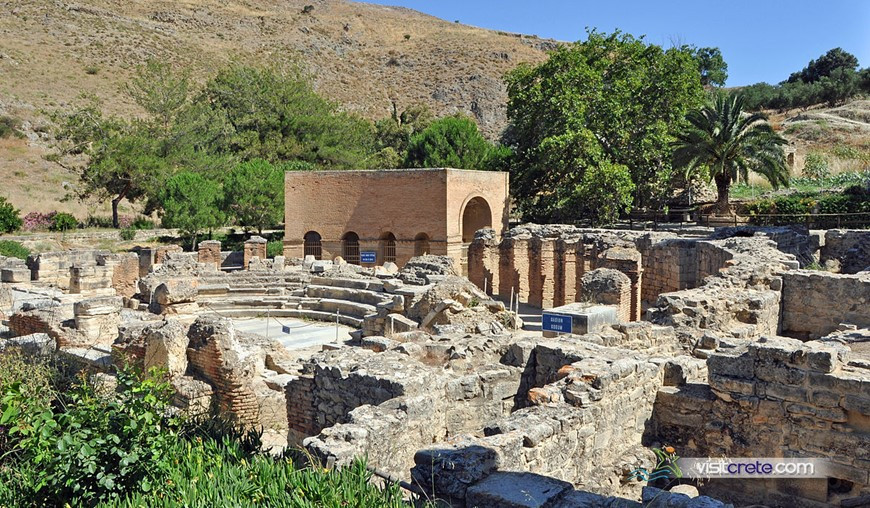 Overview: Overview:
Rediscovering the Rich History of the Archaeological Site of Gortyna (or Gortys)
Welcome to the captivating realm of the Archaeological Site of Gortyna (also known as Gortys), a place where the echoes of millennia past resonate through the very stones of Crete. Nestled within the Heraklion Prefecture, specifically in the area of Agioi Deka, Gortyna is a site steeped in historical significance and cultural heritage.
A Tapestry of Time
Neolithic Origins: The story of Gortyna begins at the cusp of the Neolithic period, around 3000 B.C. when it was first inhabited. However, it was during the Late Minoan period, spanning from 1600 to 1100 B.C., that Gortyna truly came into its own. During this era, the villa with the shrine at Kannia bore witness to the city’s blossoming cultural and economic landscape.
Archaic Awakening: By the 7th century B.C., relics of the Archaic period had already taken root in the vicinity of the Acropolis, laying the foundation for Gortyna’s enduring legacy. But it was the discovery of the Gortyna Law Code, an inscription dating back to the 5th century B.C., that illuminated the city’s prosperity and its significance in the ancient world.
Hellenistic Heights: The Hellenistic period (3rd-2nd century B.C.) witnessed Gortyna’s continued ascendancy. Its reach extended, and the city thrived as a hub of culture and governance.
Roman Rule and Beyond
Gortyna’s destiny took a momentous turn when it became an ally of Rome. During the Roman period (1st-5th centuries A.D.), Gortyna reached the zenith of its prosperity as the proud capital of the province of Crete and Cyrene. It was during this era that the Apostle Titus preached Christianity within its walls, leaving an indelible mark on the city’s spiritual landscape.
In A.D. 250, Gortyna became the stage for a profound act of martyrdom when the Ten Saints met their fate. However, the city’s trials were not over. In A.D. 824, it faced destruction at the hands of the Arabs, marking a somber chapter in its history.
Archaeological Exploration
The tale of Gortyna’s archaeological exploration began in 1884 when the Italian archaeologist F. Halbherr initiated the first investigations on the site. Since then, excavations have continued under the careful guidance of the Italian Archaeological School and the 23rd Ephorate.
Embrace the Past
The Archaeological Site of Gortyna invites you to step into the corridors of time and uncover the secrets of an ancient city that has left an indelible mark on Crete’s history. As you explore its ruins and walk in the footsteps of generations past, you’ll gain a deeper understanding of the cultural tapestry that is Gortyna.
Whether you are a history enthusiast, an archaeology aficionado, or simply a curious traveler eager to delve into the annals of time, Gortyna welcomes you to an enriching journey through antiquity. Join us as we rediscover the captivating history of this archaeological marvel, known to some as Gortyna and to others as Gortys, and celebrate its enduring legacy.
7 Fascinating Insights Gortys archaeological site
- Neolithic Origins: Gortyna’s history dates back to around 3000 B.C. when it was first inhabited during the Neolithic period.
- Late Minoan Prosperity: The city flourished during the Late Minoan period (1600-1100 B.C.), marked by significant developments such as the villa with the shrine at Kannia.
- Archaic Remnants: Relics from the Archaic period (7th century B.C.) were discovered around the Acropolis, revealing the early foundations of the city’s culture.
- Gortyna Law Code: The Gortyna Law Code, an inscription dating back to the 5th century B.C., showcased the city’s prosperity and legal significance.
- Hellenistic Ascendancy: Gortyna continued to thrive during the Hellenistic period (3rd-2nd century B.C.) and emerged as a center of culture and governance.
- Roman Capital: Gortyna reached its zenith during the Roman period (1st-5th centuries A.D.) when it became the capital of the province of Crete and Cyrene.
- Apostle Titus and Martyrdom: Apostle Titus preached Christianity within Gortyna, and in A.D. 250, the Ten Saints met martyrdom within its walls, leaving an enduring spiritual legacy.
|












Get Social